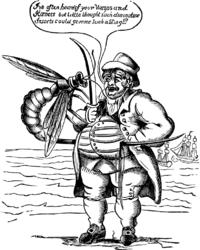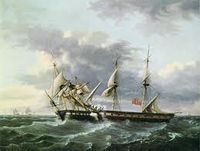Annotation:Wasp's Frolick (The)
Back to Wasp's Frolick (The)
WASP'S FROLICK, THE. American, Jig. G Major. Standard tuning (fiddle). AABC. A patriotic composition by Charles P.F. O'Hara, who included eleven of his own tunes honoring American victories of the War of 1812, and politicians of the era, in his collection of mainly traditional Irish and Scotch tunes, sold from "his new music store" at No. 70 William Street, New York, "where may be had a great variety of the most ancient ahnd modern single songs. Also a general assortment of flutes, violins, tambarines, drums, and all other musical instruments." Geoff Hore [1] (2009) remarks:
Little is known about O’Hara; he does not feature in Captain Francis O’Neill’s Irish Minstrels and Musicians published by The Regan Printing House, Chicago, 1913. It appears that he migrated to USA from Ireland in 1812, aged 31, and his occupation is given as a ‘teacher of music’. This information came from the book British Aliens in the United States during the War of 1812 by Kenneth Scott, published by Genealogical Publishing Co 1979 Baltimore. He married Phebe Elam CARLTON, daughter of Martin L and Frances Elam Carlton at Powhatan County, Virginia on 22 AUG 1816. See brideindex.info.
Researcher Nicholas Carolan [2] finds mention of O'Hara in the New York paper Columbian of January 2nd, 1813, which says that Charles P.F. O’Hara was a multiinstrumentalist who had ‘resided many years in the west of Ireland’. His name appears on a list of subscribers to a volume called A New System of Mythology, in Three Volumes; Giving a Full Account of the Idolatry of the Pagan World (by Robert Mayo M.D., 1816), that indicates O'Hara was living in Baltimore at the time.
The American victory of the sloop-of-war Wasp [3] over the brig-sloop HMS Frolick in October, 1812, was heralded as a triumph in America. This despite the fact that both ships were badly damaged after the engagement and barely seaworthy. A British frigate soon came along and recaptured both vessels, but American gunnery had proved decisive in the original engagement.


This rhyme accompanied the period political cartoon at right:
A Wasp took a Frolic and met Johnny Bull,
Who always fights best when his belly is full.
The Wasp thought him hungry by his mouth open wide,
So, his belly to fill, put a sting in his side"
Source for notated version:
Printed sources: O'Hara (The Gentleman's Musical Repository), 1813.
Recorded sources:
Back to Wasp's Frolick (The)
